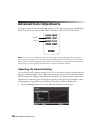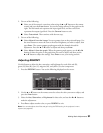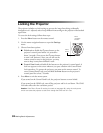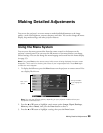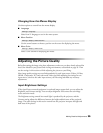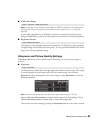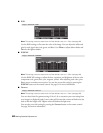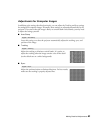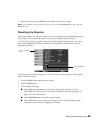
38 Making Detailed Adjustments
■ Progressive
Converts interlaced to progressive signals. The projector uses 3D DigiScan
™
HD
Circuitry Processing for video-sourced images. For film-sourced images, you can select
from 2-3 or 2-2 pulldown detection.
Leave the setting on
Auto for viewing movies on a player that produces interlaced output.
Select
Video for watching videos captured with a video camera. Set to Film if flickering
appears with the
Auto setting.
Note: This setting can be used only when viewing composite video or S-video signals, or 480i
or 576i, or 1080i signals input through the Component, HDMI 1, or HDMI 2 ports (see page 65).
■ Motion Detection
This setting specifies how signals are converted to progressive signals. Select a lower
setting for slow-moving or still images (
S) or select a higher number for video images
(
M).
Note: This setting can be used only when viewing composite video or S-Video signals, or 480i
or 576i, or 1080i signals input through the Component, HDMI 1, or HDMI 2 ports (see page 65).
■ Noise Reduction
Note: This setting cannot be used when the Color Mode is set to x.v. Color (see page 29) or
with a signal input through the PC port.
This setting reduces flickering of analog images. You can select from 3 levels of noise
reduction.
■ 2-2 Pull-down
Note: This setting can be used only when viewing a 1080p/24Hz signal input through the
Component, HDMI1, or HDMI2 ports (see page 65). This setting cannot be used when the
Color Mode is set to x.v. Color (see page 29) or with a signal input through the PC port.
This setting allows you to select whether images are projected with 2-2 pulldown
detection or 2-3 pulldown detection. Select
On for 2-2 pulldown detection.
Signal > Progressive
Signal > Motion Detection
Signal > Advanced > Noise Reduction
Signal > Advanced > 2-2 Pull-down



